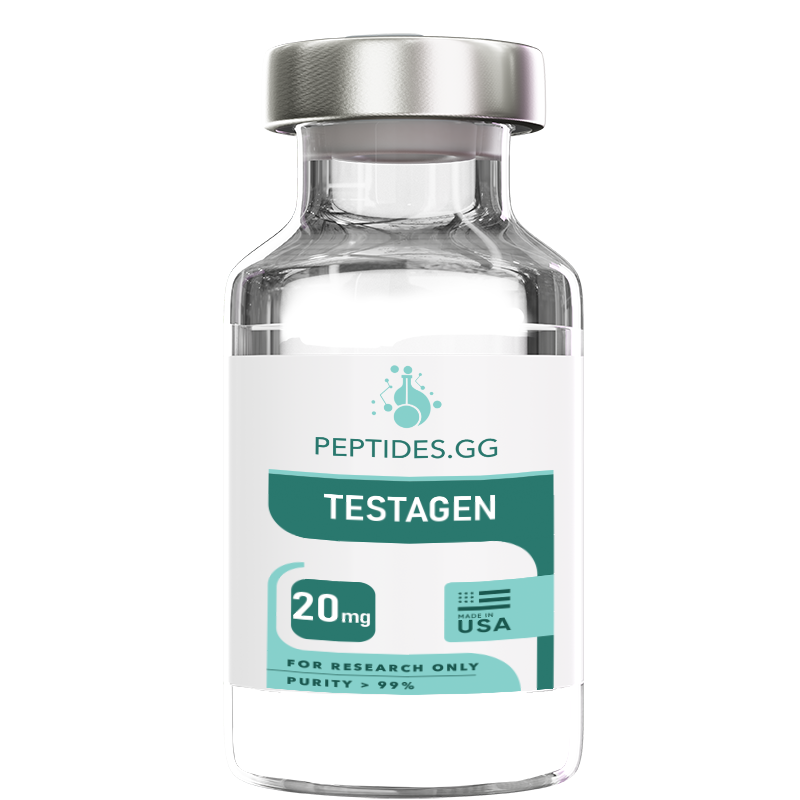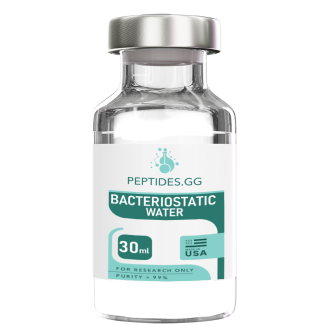Buy Testagen (Bioregulator) peptide for research applications. High-purity Testagen (Bioregulator) research peptide available for laboratory studies and scientific investigation. Shop premium quality research-grade peptides manufactured in the USA with comprehensive Certificate of Analysis documentation.
Important: All products are intended as research chemicals only for laboratory and in vitro testing and experimentation. All product information is educational and not to be taken as medical advice. No products are for human or animal use.
Testagen (Bioregulator)
$60.00
- Free Delivery on all orders over $200
- Earn 5% Store Credit with Every Order
- Same Day Shipping Before 1 PM PST
- 10% Discount for Cryptocurrency Payments
14-day money-back guarantee
If you are not satisfied with the product, simply return it and we will refund your money

Buy Testagen (Bioregulator) peptide for research applications. High-purity Testagen (Bioregulator) research peptide available for laboratory studies and scientific investigation. Shop premium quality research-grade peptides manufactured in the USA with comprehensive Certificate of Analysis documentation.
Important: All products are intended as research chemicals only for laboratory and in vitro testing and experimentation. All product information is educational and not to be taken as medical advice. No products are for human or animal use.
Research Overview
Testagen serves as a research tool for investigating testicular-specific bioregulation and gonadal tissue function in laboratory settings. This peptide bioregulator belongs to the class of organ-specific peptide preparations originally developed through research on tissue-specific regulatory mechanisms.
Testagen research applications extend across multiple areas of testicular biology including Leydig cell steroidogenesis, Sertoli cell support function, spermatogenic cell development, testosterone production, and testicular aging processes. Laboratory protocols examine these effects in cell culture systems, testicular explants, and preclinical animal models.
Molecular Characteristics
Complex Composition:
- Classification: Organ-specific bioregulator peptide complex
- Source Material: Bovine testicular tissue (pharmaceutical grade)
- Molecular Weight Range: 1,000-10,000 Da (heterogeneous peptide mixture)
- Peptide Content: Multiple short-chain peptides (typically 2-20 amino acids)
- Form: White to off-white lyophilized powder
- Solubility: Water, phosphate buffered saline, cell culture media
Research Applications
Leydig Cell and Steroidogenesis Research
Testagen serves as a research tool for investigating testosterone-producing cells:
- Testosterone Production Studies: Investigation of androgen biosynthesis and secretion
- Steroidogenic Enzyme Research: Examination of StAR, CYP11A1, 3β-HSD, CYP17A1, 17β-HSD expression
- LH Receptor Signaling: Studies on luteinizing hormone receptor and cAMP pathway activation
- Cholesterol Transport: Research on cholesterol uptake and mitochondrial transport for steroidogenesis
- Leydig Cell Proliferation: Investigation of Leydig cell number and function regulation
Laboratory protocols employ Leydig cell cultures (primary rat/mouse Leydig cells, MA-10, MLTC-1 cells) and steroidogenesis assays.
Sertoli Cell Function Research
Research applications extend to testicular support cells:
- Sertoli Cell Barrier: Investigation of blood-testis barrier formation and tight junction proteins
- Growth Factor Production: Research on GDNF, inhibin, activin, and other Sertoli-derived factors
- Germ Cell Support: Studies on Sertoli-germ cell communication and metabolic support
- FSH Responsiveness: Examination of follicle-stimulating hormone receptor signaling
- Phagocytic Function: Investigation of apoptotic germ cell removal by Sertoli cells
Experimental approaches include Sertoli cell cultures, co-culture with germ cells, and barrier function assays.
Spermatogenesis Research
Laboratory studies investigate Testagen in male gamete development:
- Spermatogonial Stem Cells: Research on SSC self-renewal and differentiation
- Meiotic Progression: Studies on spermatocyte development and meiotic divisions
- Spermiogenesis: Investigation of spermatid differentiation and sperm maturation
- Germ Cell Apoptosis: Examination of quality control mechanisms in spermatogenesis
- Hormonal Regulation: Research on testosterone and FSH effects on germ cell development
Research protocols include spermatogenic cell isolation, stage-specific analysis, and in vitro maturation systems.
Testicular Aging Research
Testagen serves as a tool for investigating age-related testicular changes:
- Testosterone Decline: Studies on age-related reduction in androgen production (andropause)
- Leydig Cell Senescence: Examination of aging markers in steroidogenic cells
- Spermatogenic Decline: Research on reduced sperm production with aging
- Oxidative Stress: Investigation of ROS accumulation and antioxidant defense decline
- Inflammatory Changes: Studies on chronic low-grade inflammation in aging testis
Research protocols employ aging models, hormone measurements, and comparative studies across age groups.
Male Fertility Research
Laboratory studies examine Testagen in reproductive function contexts:
- Sperm Quality Assessment: Investigation of sperm count, motility, morphology regulation
- Sperm DNA Integrity: Research on chromatin packaging and DNA fragmentation
- Capacitation Studies: Examination of sperm maturation and fertilization competence
- Hormone-Fertility Relationships: Studies on testosterone, FSH, LH effects on fertility
- Environmental Factors: Investigation of heat stress, toxicant, and oxidative effects
Experimental models include sperm analysis, fertilization assays, and reproductive toxicology studies.
Testicular Function Recovery Research
Testagen research applications include tissue repair contexts:
- Post-Injury Recovery: Investigation of testicular recovery after ischemia, torsion, or trauma
- Chemotherapy Effects: Research on gonadotoxic drug effects and recovery potential
- Endocrine Disruption: Studies on recovery from hormone suppression or antagonist exposure
- Cryptorchidism Models: Examination of testicular descent and function restoration
- Varicocele Research: Investigation of venous congestion effects and improvement
Research approaches include injury models, recovery protocols, and functional restoration assessment.
Laboratory Handling and Storage Protocols
Lyophilized Powder Storage:
- Store at 2-8°C (refrigerated) in original sealed vial
- Protect from light and moisture
- Stable for 24 months refrigerated as unopened vial
Reconstitution Guidelines:
- Reconstitute with sterile water or appropriate buffer
- Add 1-2mL solvent per 10mg powder
- Gentle swirling motion recommended
- Final pH 6.5-7.5 for cell culture
Reconstituted Solution Storage:
- Short-term: 2-8°C for up to 7 days
- Long-term: -20°C in aliquots
- Avoid repeated freeze-thaw cycles
- Sterile filtration (0.22μm) for cell culture
Quality Assurance and Analytical Testing
Peptide Profile Analysis:
- HPLC peptide content verification
- Molecular weight distribution analysis
- Amino acid composition
- Peptide content determination
Purity Testing:
- Protein purity assay
- Endotoxin: <10 EU/mg
- Sterility testing
- Water content: <8%
Source Material:
- Pharmaceutical-grade bovine testicular tissue
- TSE/BSE compliance
- Standardized extraction protocols
Research Considerations
Experimental Design:
1. Concentration: 0.1-10 μg/mL in cell culture
2. Duration: 24-72 hours for gene expression; longer for steroidogenesis
3. Cell Type Specificity: Verify testicular selectivity
4. Hormone Environment: Define LH, FSH, testosterone status
5. Complex Mixture: Account for multiple potential active components
Control Groups:
- Vehicle control
- Non-specific peptide control
- Positive controls (LH, hCG, FSH)
- Tissue-specific comparisons
Mechanism Investigation:
- LH receptor signaling (cAMP/PKA pathway)
- Steroidogenic enzyme gene regulation
- Androgen receptor feedback mechanisms
- Growth factor signaling (IGF-1, EGF)
- Transcription factor modulation (SF-1, GATA4)
Compliance and Safety Information
Regulatory Status:
For in-vitro research and preclinical studies only. Not approved for human therapeutic use, dietary supplementation, or medical applications.
Intended Use:
- In-vitro cell culture research
- Testicular tissue explant studies
- In-vivo preclinical research
- Academic and institutional research
NOT Intended For:
- Human consumption
- Therapeutic treatment
- Dietary supplementation
- Veterinary applications without oversight
- Medical/clinical applications
—
 25% OFF $400+ • 35% OFF $800+ ALL WEEKEND
25% OFF $400+ • 35% OFF $800+ ALL WEEKEND 


